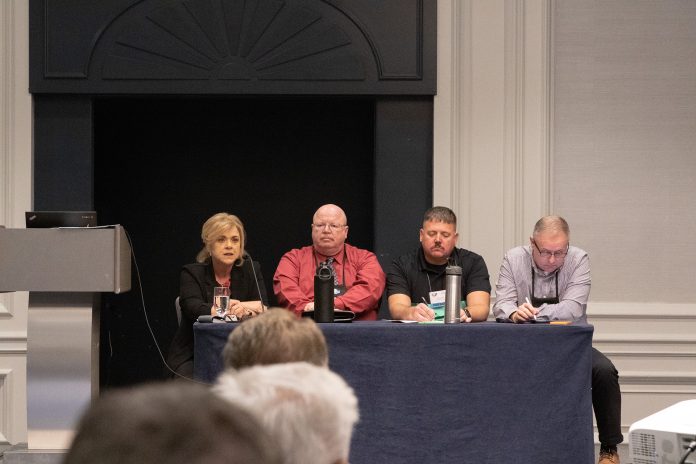WASHINGTON, D.C. — Following updates from six school bus OEMs on their electric offerings, state directors discussed the benefits and challenges of operating zero-emissions vehicles at the National Association of State Directors of Pupil Transportation Services Annual Conference.
Representatives from Thomas Built Buses, BYD, Blue Bird, the Lion Electric Company, IC Bus and Pegasus Specialty Vehicles provided updates on their electric vehicles and discussed the evolution of electricity over the past several years during a session on Saturday.
One discussion stemming from the conference session was about vehicle range, which has already doubled in the past four years. Malinda Sandhu, the director of sales at Lion Electric, noted that the same momentum will result in an improved battery and vehicle range that could be available as soon as the next two years.
Bob Ford, the regional sales manager for IC Bus, added that while right now electric school buses might not be right for every route, they are right for every school district. He noted that it’s important for transportation directors to select the routes the vehicles service rather than vice versa.
Representatives from the World Resources Institute also discussed the implementation of electric vehicles and how the number has grown rapidly in just the past year.
Following the OEM update, state directors Anna Borges of California, Mike Bullman of South Carolina, Patrick McManamon of Vermont, and Chris Kath of Indiana sat in on a panel discussion about the implementation of electric vehicles within their state and region.
Borges noted that California is currently operating a little over 600 electric school buses, but another 1,200 school buses being ordered will bring the state’s total to 1,800 within the next year. She added that California has a lot of funding available that can be used on electric school buses, including $1.5 billion in one-time Proposition 98 funds that was included in the recently passed state budget.
Kath noted that Indiana currently operates eight electric school buses from three different manufacturers. He noted that the school districts that have them say they love them and would buy more if they had the funding. He added that there was some pushback from mechanics as they’re not used to working on electric drives.
Bullman, who is also the NASDPTS secretary, said his state currently has four electric school buses but was awarded nearly $55.7 million from the U.S. Environmental Protection Agency Clean School Bus Program (CSBP) rebate last week. South Carolina is the only state that owns and maintains the fleet of school buses, which Bullman said is an advantage as the buses deployed across the state there is centralized data point collection.
He noted that driver habits and operational conditions play a huge role in the vehicle range. The additional buses with the CSBP are all going to school districts of different geographic locations, so he will be able to track the buses in all situations.
Related: Pending FMCSA Notices of Proposed Rulemaking Include Driver Fitness, Speed Limiters,
Related: EPA Announces Recipients of Clean School Bus Program Rebate Awards
Related: 2nd Round of Applications for California VW Grants to Open
Related: NASDPTS Announces Proposed Bylaw Changes
Related: NASDPTS Seeks Applicants to Fill Administrative, Member Services Director Position
McManamon, who concludes his two-year term as NASDPTS president this weekend, said his state requires the electric school buses to have blue bumpers. He added that leaders need to be aware of the licensing side and specs of the buses to ensure they are in state compliance.
Mike Simmons of Arkansas, who takes over the NASDPTS presidency, warned audience members to ensure that the electric school buses purchased by the state meet their state specifications as not all current models meet requirements.
One audience member asked if anyone has had experience with charger maintenance and/or repair. Borges shared that one California school district has 20 electric school buses out of service due to complications with charging infrastructure. She added that the California Energy Commission and California Air Resources Board recommend that when receiving electric school buses via a grant, to not scrap the bus being replaced for 12 months to work out any issues with the EV.
Kath said Indiana is working to update its state specs with electric vehicle information, now going to include a section on chargers.














